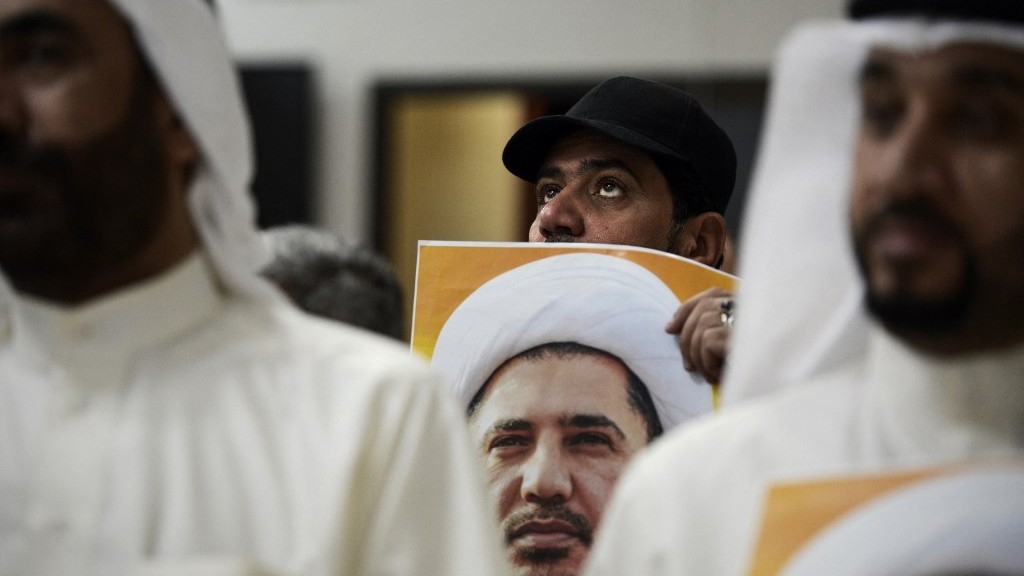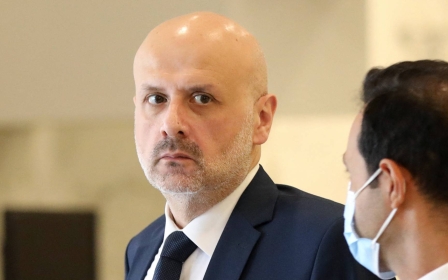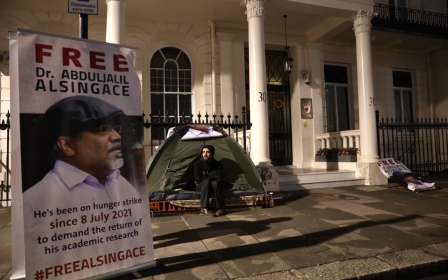Bahrain dissidents in Lebanon living in fear after deportation decision

Members of an outlawed Bahraini political party fully anticipated that their criticism of human rights violations in their home country from Lebanon last week would upset authorities in Manama.
What surprised al-Wefaq activists, who sought refuge in Lebanon after their party was banned in 2016, was that Lebanon's interior minister swiftly ordered their deportation after they held a news conference and released several reports highlighting abuse in the kingdom.
While the move is seen as a step to ease a diplomatic row between Lebanon and several Gulf states, which is impacting an already battered Lebanese economy, the decision puts all Bahraini opposition figures in danger, activists told Middle East Eye.
'Beirut became a refuge for so many of our colleagues and fellow activists aspiring for a better Bahrain'
- Baqir Darwish, Bahrain Forum for Human Rights
"Beirut became a refuge for so many of our colleagues and fellow activists aspiring for a better Bahrain," said Baqir Darwish, head of the Bahrain Forum for Human Rights, who has lived in the Lebanese capital for five years.
Darwish fled Bahrain after he was sentenced to five years in prison for tweeting about human rights violations and abuses by Bahraini authorities.
New MEE newsletter: Jerusalem Dispatch
Sign up to get the latest insights and analysis on Israel-Palestine, alongside Turkey Unpacked and other MEE newsletters
He said the deportation decision this week not only violates his universal right to free speech but also "reflects the security aspect of the Bahraini state and its continuous effort to wipe out civil and political life in exile after it was able to terminate it inside Bahrain".
Yusef Rabi'i, an al-Wefaq member who took refuge in Beirut after Bahraini authorities cracked down on the 2011 pro-democracy uprising in the island kingdom, said he felt a threat to his rights and security in the wake of the decision.
"I was immediately contacted by the UNHCR as I am a registered refugee," he told MEE, saying he was awaiting further clarification on how Lebanon's General Security, the agency that would deport the members, would deal with the order.
Rabi'i said he hoped that, instead of working against opposition figures, Bahraini authorities would acknowledge their legitimacy, pointing out that al-Wefaq won 18 seats in Bahrain's parliament in the 2010 elections.
Sayed Ahmed Alwadaei, director of the London-based Bahrain Institute for Rights and Democracy, said in a statement it was "shameful to see how rich Gulf states are taking advantage of Lebanon's economic crisis to score its own malicious political goals".
"When Bahrain cannot bully legislators criticising its abysmal rights record in capitals like London, Washington and Brussels, it seems it can only muscle up against fragile states."
One phone call
It took only a few hours after a call with his Bahraini counterpart for Bassam Mawlawi, Lebanon's recently appointed interior minister, to announced the deportation on Wednesday.
The interior ministry in Manama released a readout of their conversation, stating: "Lawbreakers who spread malicious allegations against Bahrain in Lebanon had abused both Bahrain and Lebanon."
Bahrain's interior minister, the statement said, "highlighted that such practices harm Lebanon and its people, valuing the concerns and care of the Lebanon official and his dedication to taking legal steps against the violators".
Sandrella Merhej, a Lebanese lawyer and human rights activist who delivered a speech at the news conference, told MEE that the event was of a legal nature, not political.
"The conference aimed at shedding light on the human rights violations and illegal practices by the authorities in Bahrain documented by al-Wefaq," she said. "We did not invent these violations, but we simply shed light on it with a request to the authorities in Bahrain to find a solution for it."
The reaction from Lebanon's government caught many activists by surprise, she said.
"We are not an authoritarian state, and our constitution guarantees public freedom and freedom of speech," Merhej said.
"The Lebanese government dealing with Bahrain's request should have been on a diplomatic level, a simple statement ensuring Lebanon's respect to the state of Bahrain would have sufficed, instead of acting on behalf of Bahraini authorities."
Adam Chamseddine reported from Beirut; Dania Akkad reported from London
Middle East Eye delivers independent and unrivalled coverage and analysis of the Middle East, North Africa and beyond. To learn more about republishing this content and the associated fees, please fill out this form. More about MEE can be found here.





